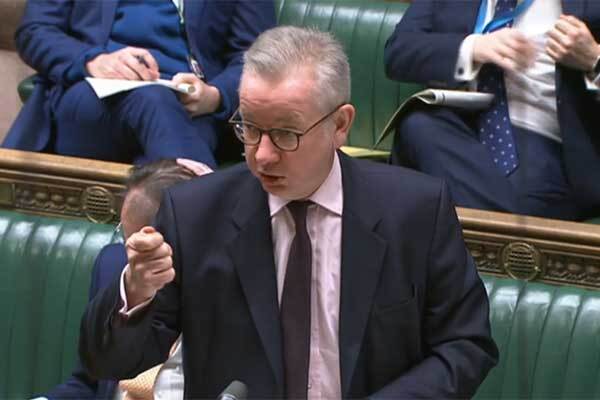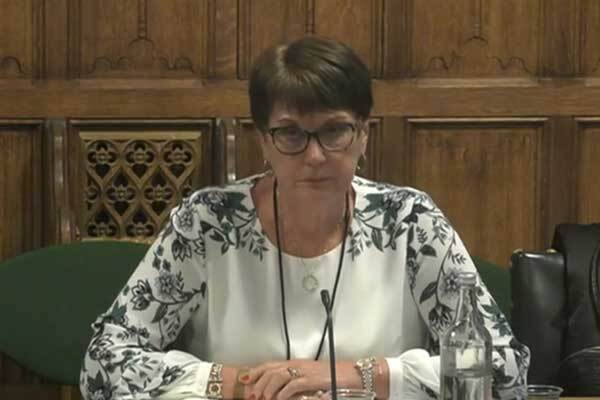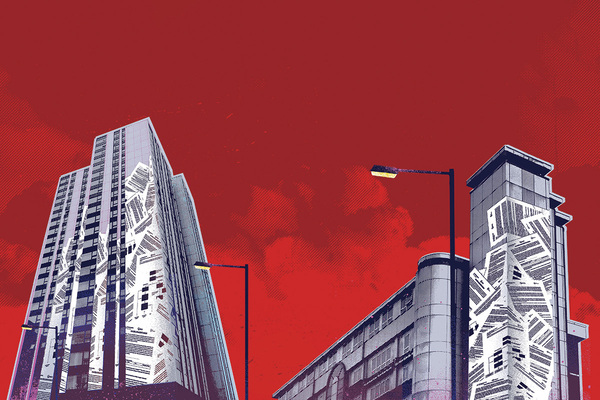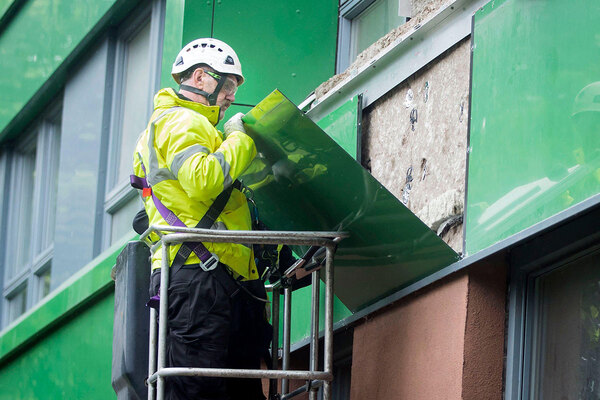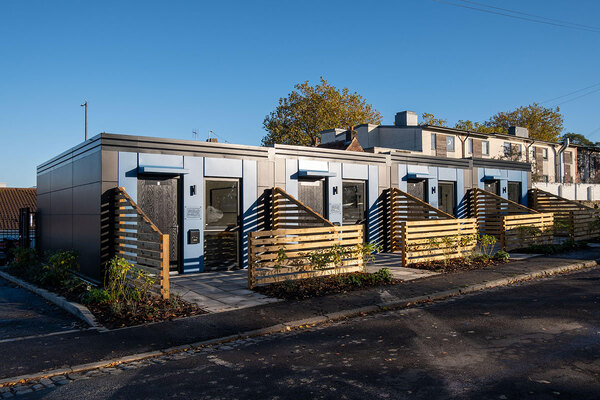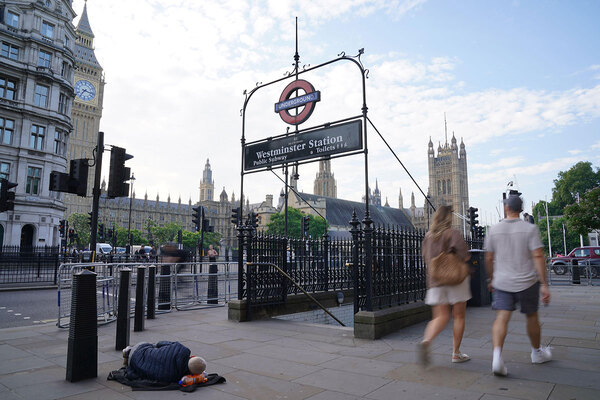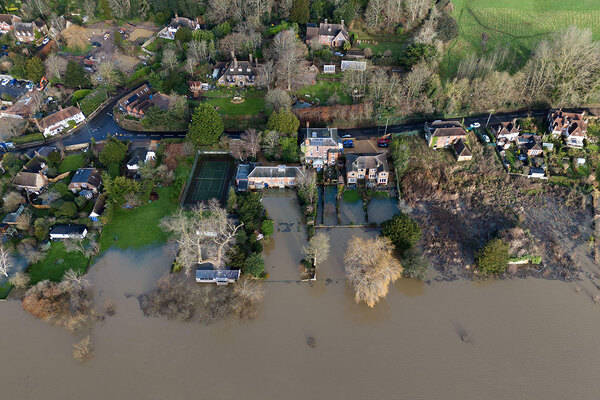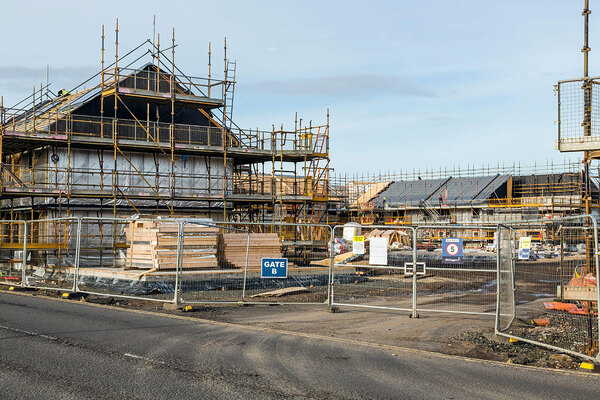Gove mulls extra cladding cash and public contract bans under proposed building safety changes
Developers responsible for dangerous cladding could be barred from public contracts and an extra £1bn could be released for medium-rise buildings in measures being considered by government, Inside Housing can reveal.
Sources close to government have indicated that housing secretary Michael Gove is currently mulling stricter penalties for those seen to be responsible for building safety issues, while also considering plans to bolster the £5bn Building Safety Fund.
The proposals could see developers and contractors barred from accessing government contracts and funding schemes, such as Help to Buy, if they have a record of persistent building safety issues, or are not seen to be rectifying the issues quickly enough.
The intervention is one of a number of proposals being considered by Mr Gove aimed fixing the building safety crisis, which is currently affecting around 1.2 million leaseholders living in blocks across the country.
Other proposals include:
- Giving an addition £1bn to the Building Safety Fund to remediate medium-rise buildings
- Give an additional £30m to Waking Watch Relief Fund
- Scrapping the planned leaseholder loan scheme for buildings under 18 metres tall
- Remove ‘consolidated advice note’
- Speed up cladding remediation by prioritising highest-risk buildings
Last week Mr Gove told MPs in parliament that he intended to reveal a series of measures to tackle the building safety crisis “shortly”.
At the heart of these measures will be a move to try to protect leaseholders from huge remediation bills, and instead push for more contributions from developers, contractors and manufacturers seen as responsible for the crisis.
In some cases, leaseholders are facing bills in excess of £100,000 to fix historic fire safety issues, which is causing widespread mental health issues for those trapped.
To protect leaseholders, Mr Gove is also looking at adding more money to the Building Safety Fund, with an extra £1bn for the remediation of medium-rise buildings. This will take the total amount of money paid by the government to help fix dangerous cladding to £4bn, with an additional £2bn expected to be raised over the next decade from the residential property developer tax.
Estimates from the Housing and Communities Select Committee put an estimate on the total bill for fixing the building safety crisis as in excess of £15bn.
The government will also put £30m more into the Waking Watch Relief Fund. The fund was set up last year and is primarily used to fund the installation of all building alarms in buildings where expensive waking watches, which can cost in excess of £20,000 a month, are in place.
The additional money comes as the government looks to distance itself from 24/7 waking watch patrols in buildings, which can cost leaseholders hundreds of pounds a month. In November, prime minister Boris Johnson called the patrols “absurd”.
The cladding loan scheme, which would see leaseholders in medium-rise buildings pay for remediation work monthly over a period of decades, also looks likely to be scrapped.
First mooted by former housing secretary Robert Jenrick in February, it was met with widespread criticism by leaseholders across the country.
In a Housing, Communities and Local Government Select Committee hearing in November, Michael Gove said that he would be pausing the loan scheme plan, stating that he was “disturbed with the principle of leaseholders having to pay anything”.
For those in shared ownership homes, the government is also looking at ways in which it can allow these leaseholders to sub-let their homes. This is currently not allowed under general shared ownership leases, however some associations like L&Q have allowed this to happen.
In addition to the crippling remediation bills many leaseholders are facing, hundreds of thousands are currently trapped in their homes as a result of the external wall system (EWS) crisis.
The EWS1 form was launched in December 2019 by the Royal Institution of Chartered Surveyors as a way of unsticking the flat-sale market.
It requires a competent professional to check whether a building has dangerous materials and requires remediation. If it does, banks will usually not be willing to provide mortgages on these flats, leaving many leaseholders trapped.
In July, Mr Jenrick called on all lenders not to ask for EWS1 forms on blocks below 18 metres tall. It came after research by government advisors which concluded that there was “no evidence of systemic risk of fire in blocks of flats”.
Inside Housing understands that the government is now trying to implement changes that will significantly reduce the number of checks required, as well as support those carrying out the checks.
As promised, the consolidated advice note, the piece of legislation which states that all buildings regardless of height must be checked, will be removed before Christmas.
The government is also looking at a government-backed insurance scheme for those carrying out the fire safety checks, to try to bolster the numbers of building inspectors and give them more protection over decisions.
There could also be more government oversight of the building checks in the future, with a central body set up to audit checks to ensure that a proportional approach is being taken.
Inside Housing also understands that a taskforce will be set up within the Department for Levelling Up, Housing and Communities (DLUHC) that will work exclusively to recover funds from those companies that it feels are liable for some of the issues.
Next month the government is set to host an event that will bring together all stakeholders involved in the current cladding scandal, including campaigners, developers and managing agents, that will focus on ways to speed up remediation of dangerous buildings and protect leaseholders from costs.
Leasehold groups said it was positive that Mr Gove was looking at these areas and it provided evidence that, for the first time in a while, the government was listening to them, and that there was the political will to protect leaseholders from burdensome costs.
Giles Grover from the End our Cladding Scandal Campaign said: “Solving this crisis has always been about choice – we are slowly beginning to have more comfort that the right choices are being made by Mr Gove and that he has the mandate and authority to persuade Rishi Sunak to help us properly.
“It has long been painfully clear that an increase in grant funding is urgently required to bring about a fair end to this scandal that has blighted our lives for years – but we still need to see action on the ground to make buildings safe at pace, and we still need cast-iron guarantees that we will be protected from all costs to do so.
“Our heads continue to tell us to be cautious but our hearts are increasingly optimistic that we will soon begin to be able to think about moving on with our lives.”
A DLUHC spokesperson said: “We do not comment on speculation. It is unacceptable and unfair that leaseholders are facing excessive bills – they are innocent parties in this and building owners and industry must make buildings safe without passing on costs to them.
“The secretary of state is looking at our work in this area to ensure we are doing everything we can to protect and support leaseholders, and we will be setting out further proposals in due course.”
Sign up for our fire safety newsletter
Already have an account? Click here to manage your newsletters
